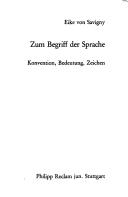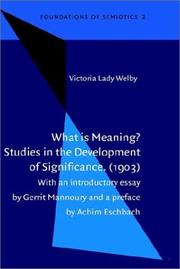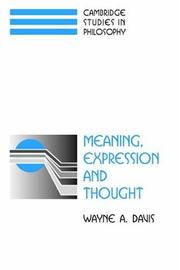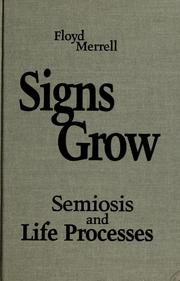| Listing 1 - 10 of 372 | << page >> |
Sort by
|
Book

Year: 1938 Publisher: Chicago, Ill., The University of Chicago press
Abstract | Keywords | Export | Availability | Bookmark
 Loading...
Loading...Choose an application
- Reference Manager
- EndNote
- RefWorks (Direct export to RefWorks)
Book
Year: 1976 Publisher: New York, N.Y. The Free Press / Macmillan Publishing Co., Inc.
Abstract | Keywords | Export | Availability | Bookmark
 Loading...
Loading...Choose an application
- Reference Manager
- EndNote
- RefWorks (Direct export to RefWorks)
social science --- psychology --- sociology --- psychiatry --- history and philosophy --- unified science of man
Book
Abstract | Keywords | Export | Availability | Bookmark
 Loading...
Loading...Choose an application
- Reference Manager
- EndNote
- RefWorks (Direct export to RefWorks)
Philosophy of language --- Semantics (Philosophy) --- Semantics (Philosophy). --- Intension (Philosophy) --- Logical semantics --- Semantics (Logic) --- Semeiotics --- Significs --- Syntactics --- Unified science --- Language and languages --- Logic, Symbolic and mathematical --- Logical positivism --- Meaning (Psychology) --- Philosophy, Modern --- Semiotics --- Signs and symbols --- Symbolism --- Analysis (Philosophy) --- Definition (Philosophy)

ISBN: 3150279976 3150079977 Year: 1983 Publisher: Stuttgart Reclam
Abstract | Keywords | Export | Availability | Bookmark
 Loading...
Loading...Choose an application
- Reference Manager
- EndNote
- RefWorks (Direct export to RefWorks)
Philosophy of language --- Language and languages --- Semantics (Philosophy) --- Intension (Philosophy) --- Logical semantics --- Semantics (Logic) --- Semeiotics --- Significs --- Syntactics --- Unified science --- Philosophy --- Logic, Symbolic and mathematical --- Logical positivism --- Meaning (Psychology) --- Philosophy, Modern --- Semiotics --- Signs and symbols --- Symbolism --- Analysis (Philosophy) --- Definition (Philosophy)
Book
ISBN: 0139145982 013914580X 9780139145988 9780139145803 Year: 1970 Publisher: Englewood Cliffs (N.J.): Prentice Hall
Abstract | Keywords | Export | Availability | Bookmark
 Loading...
Loading...Choose an application
- Reference Manager
- EndNote
- RefWorks (Direct export to RefWorks)
Semantics (Philosophy) --- Intension (Philosophy) --- Logical semantics --- Semantics (Logic) --- Semeiotics --- Significs --- Syntactics --- Unified science --- Language and languages --- Logic, Symbolic and mathematical --- Logical positivism --- Meaning (Psychology) --- Philosophy, Modern --- Semiotics --- Signs and symbols --- Symbolism --- Analysis (Philosophy) --- Definition (Philosophy) --- Semantics (Philosophy).
Book
ISBN: 0903137100 Year: 1967 Publisher: London Human context books
Abstract | Keywords | Export | Availability | Bookmark
 Loading...
Loading...Choose an application
- Reference Manager
- EndNote
- RefWorks (Direct export to RefWorks)
Semantics (Philosophy). --- Sociology --- Methodology. --- Semantics (Philosophy) --- Intension (Philosophy) --- Logical semantics --- Semantics (Logic) --- Semeiotics --- Significs --- Syntactics --- Unified science --- Methodology --- Language and languages --- Logic, Symbolic and mathematical --- Logical positivism --- Meaning (Psychology) --- Philosophy, Modern --- Semiotics --- Signs and symbols --- Symbolism --- Analysis (Philosophy) --- Definition (Philosophy)

ISBN: 9027232725 9786613328793 1283328798 9027280452 9789027280459 9789027232724 9781283328791 6613328790 9789027232724 Year: 1983 Publisher: Amsterdam, Netherlands Philadelphia, Pa. J. Benjamins
Abstract | Keywords | Export | Availability | Bookmark
 Loading...
Loading...Choose an application
- Reference Manager
- EndNote
- RefWorks (Direct export to RefWorks)
In "What is Meaning" (1903) the author elaborates on the fundamental tenets of her theory of sign, to which she give the overall term significs . One of the main obstacles to an adequate theory of meaning, in Lady Welby s opinion, is the unfounded assumption of fixed sign meaning. "There is, strictly speaking, no such thing as the Sense of a word, but only the sense in which it is used the circumstances, state of mind, reference, universe of discourse belonging to it. The Meaning of a word is the intent which it is desired to convey the intention of the user. The Significance is always manifold, and intensifies its sense as well as its meaning, by expressing its importance, its appeal to us, its moment for us, its emotional force, its ideal value, its moral aspect, its universal or at least social range." This facsimile of the 1903 edition of "What is Meaning" is accompanied by an essay on "Significs as a Fundamental Science" by Achim Eschbach, and "A Concise History of Significs" by G. Mannoury.
Semiotics --- Lexicology. Semantics --- Linguistics --- Meaning (Psychology) --- Semantics (Philosophy) --- Intension (Philosophy) --- Logical semantics --- Semantics (Logic) --- Semeiotics --- Significs --- Syntactics --- Unified science --- Language and languages --- Logic, Symbolic and mathematical --- Logical positivism --- Philosophy, Modern --- Signs and symbols --- Symbolism --- Analysis (Philosophy) --- Definition (Philosophy) --- Psychology

ISBN: 1107127106 1280414898 1139145592 051117005X 0511065663 0511059353 0511297157 0511498764 0511067798 9780511065668 9780511498763 9780511067792 9786610414895 6610414890 9780521555135 0521555132 9780521039048 0521039045 Year: 2003 Publisher: Cambridge : Cambridge University Press,
Abstract | Keywords | Export | Availability | Bookmark
 Loading...
Loading...Choose an application
- Reference Manager
- EndNote
- RefWorks (Direct export to RefWorks)
This philosophical treatise on the foundations of semantics is a systematic effort to clarify, deepen and defend the classical doctrine that words are conventional signs of mental states, principally thoughts and ideas, and that meaning consists in their expression. This expression theory of meaning is developed by carrying out the Gricean programme, explaining what it is for words to have meaning in terms of speaker meaning, and what it is for a speaker to mean something in terms of intention. But Grice's own formulations are rejected and alternatives developed. The foundations of the expression theory are explored at length, and the author develops the theory of thought as a fundamental cognitive phenomenon distinct from belief and desire, argues for the thesis that thoughts have parts, and identifies ideas or concepts with parts of thoughts. This book will appeal to students and professionals interested in the philosophy of language.
Semantics (Philosophy) --- Language and languages --- Intension (Philosophy) --- Logical semantics --- Semantics (Logic) --- Semeiotics --- Significs --- Syntactics --- Unified science --- Logic, Symbolic and mathematical --- Logical positivism --- Meaning (Psychology) --- Philosophy, Modern --- Semiotics --- Signs and symbols --- Symbolism --- Analysis (Philosophy) --- Definition (Philosophy) --- Philosophy. --- Arts and Humanities --- Philosophy

ISBN: 128204530X 144267993X 9786612045301 9781442679931 9781282045309 0802007783 0802071422 9780802071422 9780802007780 0802071422 9780802071422 Year: 1996 Publisher: Toronto [Ont.] University of Toronto Press
Abstract | Keywords | Export | Availability | Bookmark
 Loading...
Loading...Choose an application
- Reference Manager
- EndNote
- RefWorks (Direct export to RefWorks)
This is the third volume in Floyd Merrell's trilogy on semiotics focusing on Peirce's categories of Firstness, Secondness, and Thirdness. In this book the author argues that there are passageways linking the social sciences with the physical sciences, and signs with life processes. This is not a study of the semiotics of life, but rather of semiosis as a living process. Merrell attempts to articulate the links between thought that is rooted in that which can be quantified and thought that resists quantification, namely that of the consciousness. As he writes in his preface, he is intent on 'fusing the customary distinctions between life and non-life, mind and matter, self and other, appearance (fiction) and "reality," ... to reveal the everything that is is a sign.' In order to accomplish this goal, Peirce's terciary concept of the sign is crucial. Merrell begins by asking 'What are signs that they may take on life-like processes, and what is life that it may know the sign processes that brought it - themselves - into existence?' In order to answer this question he examines semiotic theory, philosophical discourse, the life sciences, the mathematical sciences, and literary theory. He offers an original reading of Peirce's thought along with that of Prigogine and of many others. Following Sebeok, Merrell reminds us that 'any and all investigation of nature and of the nature of signs and life must ultimately be semiotic in nature.'
Semantics (Philosophy) --- Intension (Philosophy) --- Logical semantics --- Semantics (Logic) --- Semeiotics --- Significs --- Syntactics --- Unified science --- Language and languages --- Logic, Symbolic and mathematical --- Logical positivism --- Meaning (Psychology) --- Philosophy, Modern --- Semiotics --- Signs and symbols --- Symbolism --- Analysis (Philosophy) --- Definition (Philosophy) --- Semantics (Philosophy).
Book
ISBN: 3110323583 9783110323580 3868381139 9783868381139 3110323036 9783110323030 9783868381139 9783110323030 Year: 2013 Volume: v. 4 Publisher: Berlin Boston
Abstract | Keywords | Export | Availability | Bookmark
 Loading...
Loading...Choose an application
- Reference Manager
- EndNote
- RefWorks (Direct export to RefWorks)
The basic hypothesis of this book is that linguistic reference to kinds should be seen as reference to sortal concepts, i.e. cognitive categories for identifying and classifying objects. Viewed that way, kinds serve as the interface between the conceptual system and the grammatical system. Kind-level predicates differ as to whether they presuppose (e.g. to be extinct) or entail (e.g. to invent) the existence of objects, with crucial consequences for the interpretation of indefinite argument noun phrases. Moreover, object reference always involves underlying kind reference, but kind reference does not always involve object reference. This asymmetry, once recognized, proves useful in solving otherwise puzzling problems in semantic composition.
Semantics (Philosophy) --- Intension (Philosophy) --- Logical semantics --- Semantics (Logic) --- Semeiotics --- Significs --- Syntactics --- Unified science --- Language and languages --- Logic, Symbolic and mathematical --- Logical positivism --- Meaning (Psychology) --- Philosophy, Modern --- Semiotics --- Signs and symbols --- Symbolism --- Analysis (Philosophy) --- Definition (Philosophy)
| Listing 1 - 10 of 372 | << page >> |
Sort by
|

 Search
Search Feedback
Feedback About
About Help
Help News
News